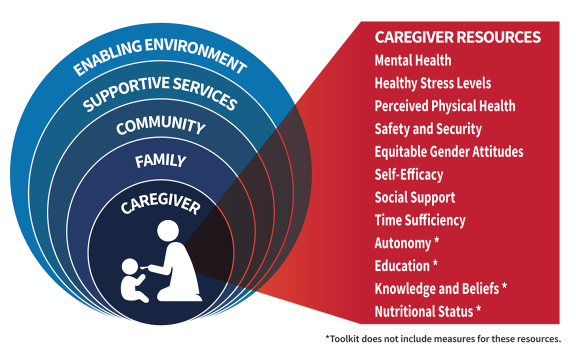Supporting caregivers to improve child nutrition
Many child health, nutrition, and development efforts focus on caregivers, those persons responsible for providing nurturing care to infants and young children. To make positive changes in nutrition, caregivers need to draw on resources linked to their own physical and psychological well-being and sense of self.
“Resources” often refer to food, money, assets, or other material items. In this toolkit, the term “Caregiver Resources” refers to intangible resources, including psychosocial factors (such as mental health, social support, self-efficacy) and other resources such as time sufficiency. These are resources needed by caregivers, but the source may be the family and the broader community. When caregivers have these resources, they can:
- provide care that produces positive child health, nutrition, and development outcomes.
- participate in services or programs to improve child outcomes.
Caregiver Resources reflect family, community, and societal contexts

We can enhance efforts to improve child nutrition by addressing how Caregiver Resources influence participant engagement and program impact. Strengthening these resources also serves to improve caregivers’ own well-being and quality of life. See more on why Caregiver Resources matter.
Why Create a Toolkit to Measure Caregiver Resources?
Proper care—including all components of nurturing care—plays a critical role in shaping children’s health, nutrition, and development (UNICEF 2020). In addition to adequate access to food and other material resources, caregivers need numerous psychosocial and other non-material resources to provide high quality care. This toolkit focuses on measures of these Caregiver Resources. The toolkit is designed to encourage more acknowledgement, support, and measurement of Caregiver Resources that are likely to be relevant to providing optimal feeding and nurturing care for young children. For more information see How we developed the toolkit.
Measuring Caregiver Resources enables nutrition programs and studies to design and implement social and behavior change activities with greater impact (See more in Why measure Caregiver Resources?). Understanding which Caregiver Resources are most influential across settings depends on strong and consistent measurement in monitoring, evaluation, and research to better define these resources and how they impact effectiveness.
Measuring Caregiver Resources is a step toward recognizing the valuable roles of caregivers and developing comprehensive ways to support their contributions to child health and nutrition (and other aspects of family well-being). To facilitate these efforts, this toolkit provides easy-to-use guidance on relevant measurement tools.
UNICEF first identified adequate care practices as an underlying determinant of child survival, growth, and development in a 1990 framework for malnutrition. Engle, Menon, and Haddad then added to the UNICEF framework and included six categories of “resources for care” necessary for a caregiver to provide adequate care for a child. Since then, resources related to providing care have been identified as an underlying determinant of child health, nutrition, and development in several important frameworks, including the 2020 UNICEF Conceptual Framework on Maternal and Child Nutrition and the Nurturing Care Framework.
Overview of Toolkit
This toolkit of measures of Caregiver Resources can help program and research teams understand whether their programs successfully influence these Caregiver Resources. We can enhance the effectiveness of programs by recognizing and promoting Caregiver Resources which enable caregivers to participate in nutrition activities and adopt recommended care and feeding behaviors. Measuring Caregiver Resources is the first step toward understanding where there are gaps and how interventions can support caregivers and impact caregiving resources to improve nutrition outcomes.
This toolkit presents a set of measures of Caregiver Resources relevant to the care of young children, and in particular, nutrition outcomes. Measures for eight Caregiver Resources related to nutrition outcomes are included in this toolkit:
- mental health
- healthy stress levels
- perceived physical health
- safety and security
- equitable gender attitudes
- self-efficacy
- social support
- time sufficiency
These are measures of Caregiver Resources identified through a systematic scoping review of the literature on complementary feeding and child nutrition between 6 months to two years of age in low- and middle-income countries. These Caregiver Resources are likely to be relevant to many aspects of caregiving, child nutrition and child development.
See more information on how to use this toolkit.


